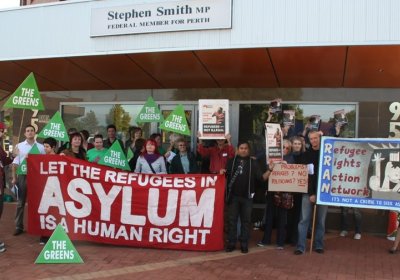The protest song is present still, yet to what extent does its significance reach the alienated world? The medium that transcends form and style seems smothered beneath the illusion of freedom of expression.
The murder of Chilean revolutionary singer Victor Jara may be a nauseating historical crime yet, today, protest singers are still exiled or assassinated in some countries. In the face of such brutal epilogues, the protest song may be mellowing its voice into a more socially acceptable role.
835
Beyond Black & White
By Manning Marable
Verso Press, 2009, 319 pages
Review by Malik Miah
Manning Marable’s latest book is an update of a valuable critique of Black and US politics first issued in 1995. He revised it last year, adding new chapters covering the period from 1995 to 2008, including an analysis of the meaning of the election of the first African American president of the US, Barack Obama, in November 2008.
In the United States, Google-owned video-sharing site YouTube has banned the video for hip hop star M.I.A.’s new single “Born Free”, citing the graphic nature of its content.
More than nine minutes long, the clip, directed by Romain Gavras, begins with heavily armed soldiers with US flags on their uniforms raiding someone’s home. The location is not known, but the setting is reminiscent of Baghdad or the Palestinian West Bank.
Farmers at Caroona on the Liverpool Plains near Quirindi, New South Wales, have been defending their properties from invasion by BHP-Billiton’s coal exploration drillers. For 615 days, until March 25, they inspired coal-threatened communities everywhere with their blockade, by saying “No” — and meaning it.
Trish Duddy and Tommy and George Clift have been at the blockade camp for every one of those 615 days, joined by other locals on a rolling roster for cups of tea, information-swapping, resolve-steeling — and symbolic trailblazing.
The Queensland Teachers Union (QTU) remains defiant about its ban on conducting the NAPLAN national schools test, despite the state Labor government forcing it to go before the Queensland Industrial Relations Commission (QIRC), said the April 29 Courier-Mail.
The QIRC hearing took place on April 30, after the QTU refused to abide by a direction from the commission, a week earlier, to lift its boycott of administering the tests.
Environmentalists have scored a win against logging in Mumbulla state forest in south-east New South Wales. Forests NSW suspending activity on April 28 after it was revealed the area may be part of an Indigenous Protection Zone.
The Narooma News that day said areas due to be logged were gazetted as Aboriginal sites in the 1980s.
Since March 29, activists have been fighting to save the native forest and its fragile koala colony.
"Say no to Roe!", chanted more than 100 people at a rally outside state parliament on April 22.
The rally was organised to oppose a five-kilometre freeway extension (Roe stage 8) between the Kwinana Freeway and Stock Road in Melville, south of Perth.
Speakers said the proposed extension was expensive, unnecessary and environmentally destructive. It would desecrate Noongar sacred sites and threaten the endangered species.
In a turbulent meeting on April 20, City of Yarra councillors voted to reinstate a ban on public drinking, 24 hours a day, seven days a week. The motion was passed by a coalition of Labor councillors and independents, five votes to four. The votes against were from the Socialist Party councillor and three Greens.
It overturned a March decision to lift the drinking ban during daylight hours.
The ban, known as Local Law 8, was passed in October and implemented in December.
A sea of about 150 red shirts packed a restaurant in Cabramatta on April 25 to show solidarity with the democracy struggle in Thailand, led by the "Red Shirt" movement.
Organised by Thai Red Australia, the night had added importance due to the threat of a military crackdown as thousands of Red Shirts occupied central Bangkok.
Speakers urged active support for the democracy uprising, in the face of brutal military attacks that have killed more than 20 civilians.
In the Cochabamba football stadium on April 22, diverse indigenous peoples paraded around the track, thousands of local peasants sat in the stands, and thousands more activists from around the globe waved flags and chanted on the field.
A common sentiment flowed through the crowd: something historic had occurred over the previous three days during the April 19-22 World People’s Conference on Climate Change and the Rights of Mother Earth organised by the Bolivian government in Cochabamba.
On April 20, 200 angry protesters shouted down state police minister Rob Johnson, as he tried to justify the anti-democratic “stop-and-search” laws. The proposed legislation allows police to conduct potentially intrusive body searches without suspicion of a crime.
The laws would also allow the minister to make any space a “declared area”, which drastically increases police powers in that area.
The crowd was also addressed by Greens MLC Giz Watson, Labor opposition police spokesperson Margaret Quirk and Dr David Indermaur from the Crime Research Centre.
Forty refugee rights supporters protested outside Labor foreign minister Stephen Smith's office on April 23, demanding an end to the government's "freeze" on asylum-seeker applications from Afghanistan and Sri Lanka.
Speakers included Refugee Rights Action Network members Phil Chilton and Victoria Martin-Iverson, Socialist Alliance candidate for Perth Alex Bainbridge and Greens Senator Scott Ludlam.
The next action planned by the Refugee Rights Action Network is an overnight vigil outside the Perth Immigration Detention Centre on May 7.
- Page 1
- Next page





